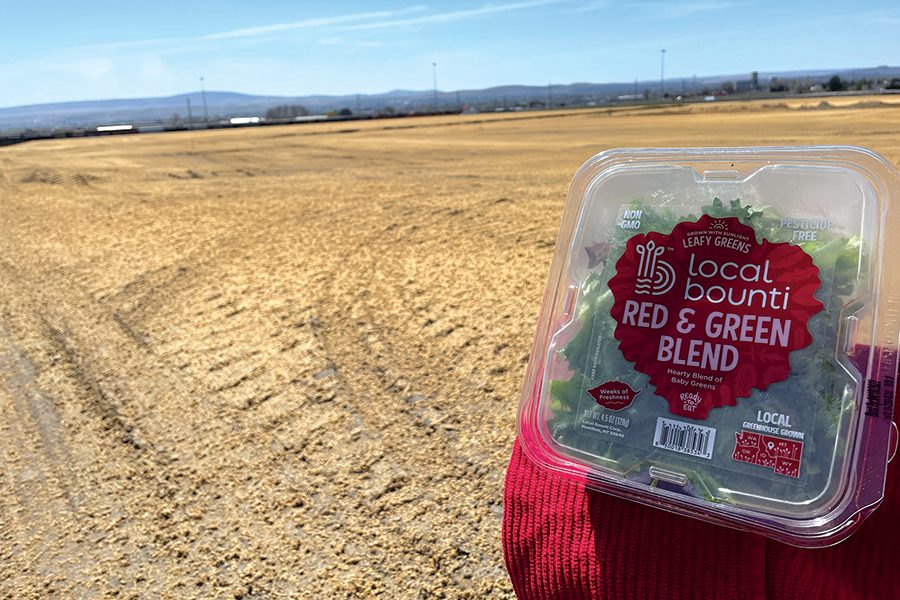
Home » Local Bounti ‘pauses’ $40M Pasco greenhouse
Local Bounti ‘pauses’ $40M Pasco greenhouse

April 13, 2022
Local Bounti Corp., the Montana ag startup behind one of the biggest economic development wins in 2021, has “paused” construction of its $40 million greenhouse complex in east Pasco.
The Pasco facility was supposed to be the second in a network of high-tech complexes where Local Bounti planned to cultivate lettuce, herbs and other greens in its pursuit of a share of the $30 billion U.S. market. The first is at its Hamilton, Montana, headquarters.
Local Bounti said it remained committed to building the facility, but was pausing to assess its needs after it entered a $123 million deal to acquire Hollandia Produce Group Inc., an established California indoor farming company that operates under the name Pete’s.
The pause
The pause, which includes stripping the construction site of all equipment other than a water tank, will “ensure that its design is fully optimized to drive best-in-class unit economics and that synergies with Pete’s existing growing systems are considered prior to continuing construction,” it said in its first-ever 10-K annual report, filed March 30 with the Securities and Exchange Commission.
The company dismissed questions that it was unhappy with the local developer and said the property, at Oregon Avenue and A Street near Big Pasco Industrial Park, is not for sale.
Matt Dallas, a spokesman, said Local Bounti sees demand for fresh produce rising in the Tri-Cities. Its existing network of greenhouses is not capable of keeping up with expected demand, he said in response to questions from the Tri-Cities Area Journal of Business.
The company will provide an update on the Pasco project in its first quarter earnings report in May.
Still 'excited' about Pasco
Dallas added that Local Bounti felt welcomed by the Pasco community and remains “very excited” about the project.
Established in 2018, Local Bounti became a publicly traded company in January 2021 when it merged with a special purpose acquisition corporation formed for that purpose, Leo Holdings III. Its shares trade on the New York Stock Exchange under the symbol LOCL.
The Pete’s transaction is expected to close in the spring and will add two indoor farming operations in California. Pete’s has a third under construction in Georgia. All three will be fitted with Local Bounti’s trademarked “Stack & Flow Technology” system.
City of Pasco officials said they received a brief notice that the work had halted but no further follow up.
Acquisition benefits
The Pete’s acquisition improves Local Bounti’s outlook, said Alex Frederick, senior analyst for PitchBook Data, a Seattle research firm that tracks private capital markets. Frederick, who specializes in emerging technology and ag tech, said Pete’s could be the addition that gives Local Bounti the edge it needs to break into a competitive industry.
The deal will add $22.7 million in new revenue. Local Bounti believes implementing its growing technology could push that to $30 million.
The facilities are an important part of production. But the deal makes even more sense because Pete’s is an established operator with 20 times the market reach of Local Bounti.
Local Bounti serves about 500 retail locations through its relationships with Albertsons/Safeway, Associated Food Stores and URM banners such as Yoke’s Fresh Market.
Pete’s adds Kroger, Target, Walmart, Whole Foods and Amazon Fresh to the mix – approximately 10,000 retail locations in 33 states and Canadian provinces.
Even if it takes time, Local Bounti’s pause could be worth the wait.
“It helps them grow very quickly and stand out in a very competitive industry,” Frederick said, noting that competition for grocery shelf space is fierce. “This seems to fall in line with that.”
Fast-growing sector
Local Bounti is an emerging operator in one of the fastest growing sectors of the ag tech world: Indoor cultivation. The idea is the efficiencies that can be brought to high value crops by moving them indoors.
In the fourth quarter of 2021, Pitchbook tracked 11 indoor agriculture deals valued at nearly $500 million, eclipsing deals in animal tech and other categories.
“This space has become very hot in the last five years. Some of the largest deals in ag tech have been in this space,” Frederick said.
And each new deal raises the ante as operators move to build ever-larger facilities that leverage economies of scale.
“That’s helping to create a model where profitability is feasible,” Frederick said.
Local Bounti has advanced a similar argument in various investor reports and SEC filings: Controlled environments and the right growing equipment dramatically increase productivity and improve the end product, leading to longer shelf life and less spoilage.
Indoor agriculture requires less water, pesticides, fertilizer and even labor. Local Bounti’s initial target: The $10 billion lettuce and herbs market in the western U.S.
Greenhouse cultivation
Local Bounti said that in late 2021, its Montana farm supported greenhouse crop cycles of 14-24 days, depending on the type of plant. It reported “17 turns” in 2021, up from nine in 2020. Even in the best conditions, a traditional outdoor farm can hope for two growth cycles in a year.
Local Bounti’s vision centers on sustainably raised greens cultivated in greenhouses close to consumers. It says it can ship to its customers’ distribution centers within 24 to 48 hours. It boasts a three- to five-week shelf life.
Picking Pasco
Siting its first facility outside of Montana in Pasco seemed to fit in with its mission to grow near population centers. The Tri-Cities is midway between the major cities of the Northwest and boasts water, power and transportation.
Local Bounti helped cement Pasco’s reputation as a center for food processing in 2021 when it became one of three food processors to invest in major new plants there.
The others were Darigold Inc., the Seattle dairy cooperative building a $500 million state-of-the-art milk drying plant in north Pasco, and Reser’s Fine Foods, the Portland salad maker building a $120 million plant, also in north Pasco.
Local Bounti financials
The future is promising, but Local Bounti remains a startup with a limited track record and minimal revenue.
It reported $638,000 in sales in 2021, compared to $82,000 the prior year. That represented a gross profit of $206,000, a positive margin of 32%.
It booked a net loss of $56.1 million, including $8.3 million for expenses associated with its merger deal with Leo Holdings, a special purpose acquisition corporation formed for the purpose of taking it public, as well as $18 million in stock-based compensation and $11.4 million in “other” income and expense items.
It has a $200 million debt financing with Cargill Inc., which together with $30 million of Local Bounti’s common stock is funding the Pete’s acquisition.
Local Bounti shares were trading at about $8 in mid-April compared to $6.10 before it announced the deal and its year-end results. The 52-week range was $4.40-$12.87.
Real Estate & Construction Local News
KEYWORDS april 2022




